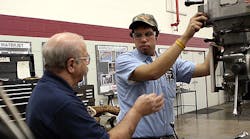Count me as one who is glad to see the subject of “business” emerge as a topic for substantive analysis and discussion this political season. It’s long been one of my peeves that stock prices or unemployment figures, or interest rates or inflation rates, are offered as proof of some economic performance. These details among many others are only momentary indicators of some particular condition. Now, though, in the heat of a presidential election we can have a close look at business, what it is and how it works, what it does and whom it helps.
President Obama posited recently (I paraphrase) that business owners and operators are not especially responsible for the success of their enterprises, but rather that the communities where they do business — the schools, utilities, public officials, and taxpayers there — foster such prosperity. The alternative view is that of the entrepreneur, a solitary figure determined to see an idea thrive and to gain the rewards that follow.
Both positions are generalizations, and it’s not necessary to detail the exceptions to either one: American politics is a binary process, so for the next several weeks we’ll be able to draw out the implications of these views. There will be no resolution because both points of view have some merit, but the contrast may provide some instruction, because there is no disagreement about what businesses are or what they do — but rather, about why they do it and how.
On one side is the view that the purpose of a business is to make money, and by doing so well and effectively it can claim success. As a result of that success, the thinking continues, it should be responsible with its profits, fair to its customers, generous to its employees, and civic-minded to its neighbors. A business owes something in return for the success it enjoys.
I’ve never met any executive or business owner who disputes the need to make a profit, but profit is a surprisingly unsatisfying motivator; it doesn’t address many of the operating or organizational concerns that emerge in the process of producing castings, for example, where problems may be rooted in physics or chemistry, or other realms not governed simply by costs. Money doesn’t solve the problems of perfecting a casting design or recruiting good workers, or many of the other problems that arise for a metalcasting business. By extension, money is not the reason generations of foundrymen and women have dedicated their lives and fortunes to building and improving their industry. I am sure the same is true in other manufacturing sectors, too, and indeed in marketing and retailing, or any type of activity that someone chooses as their business.
The truth is that ‘business’ is that which we do to express our individual ability and ingenuity. While the role of a founder or leader cannot be disputed, most businesses that prosper do so because of much more than one person’s effort. Successful businesses become communities of a sort, where many more people may apply their skills and insights, and gain fulfillment — and they may count that as their own success. They are part of the business but they remain individuals, and they enjoy the satisfaction of their success in both ways.
The Casting Industry Suppliers Assn. members that we recognize in this issue are excellent examples of this sort of business. They are more than suppliers to metalcasters: they are problem solvers and co-developers. Often they are innovators in their own right. Most important, they are full members of the metalcasting community.
There is truth in the idea that the President expounded – but it’s not a certainty: businesses and communities, and individuals, are interdependent. The prosperity of one extends to the others. Communities may call it progress. Businesses call it growth.
We’ve had too little growth in recent years, too little by which to measure our progress and too little success to share: that’s the reason profit earns so much enmity. It’s also the reason that we need to understand the value and virtue of business, of what it can do for us and what we should do to help businesses succeed. The U.S. gross domestic product averaged 3.3% annually from 1947 through 2011, according to the U.S. Bureau of Economic Analysis, so growth may seem ordinary to most of us. It is not. We have to work at it, and we have to plan for it.
U.S. GDP was just 1.5% in the second quarter of this year. We can do better than that, and we will. But we’ll grow faster if we understand what we do and why we do it, and how we are responsible for our own success.








